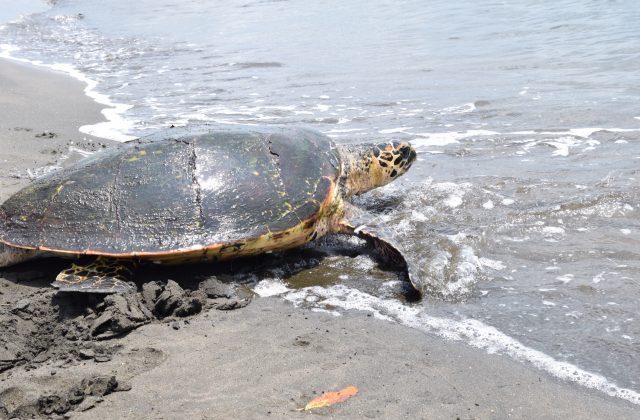
Yesterday (Sunday 3 March) marked World Wildlife Day and coverage over the weekend included an article by the Environment Secretary, published in the The Guardian, on the Illegal Wildlife Trade.
The Prime Minister tweeted in support of the United Nations Day and Defra's video tweet secured more than 20,000 views.
One of the key animals whose plight was highlighted was the turtle, which are targeted for their eggs, meat and shells. The animal has also suffered from habitat loss due to construction on coastlines and featured in the Yorkshire Times.
The UK Government’s Darwin Initiative has supported the work of Fauna & Flora International to help these important sea creatures. One such project to protect leatherback and hawksbill turtles in Nicaragua has achieved a significant reduction in the illegal harvesting of their eggs.
Environment Minister, Thérèse Coffey said:
World Wildlife Day is a chance to celebrate the wonderful individuals and organisations in coastal communities around the globe who are dedicated to protecting our flora and fauna.
I am pleased to see this successful work to protect turtles in Nicaragua. The Darwin Initiative is critical in supporting this type of international conservation project.
The UK is also a global leader in providing support and finance to help coastal communities protect and enhance vital resources, such as mangroves. This overseas support is critical to delivering on our ambition to be the first generation to leave our environment in a better state than we found it.
Joanna Elliott, Senior Director, Conservation Partnerships, Fauna & Flora International said:
In Nicaragua we have worked with our community partners to bring about a 95% reduction in the number of turtle eggs that are illegally harvested and ensured more than 190,000 leatherback and hawksbill hatchlings have begun their ocean lives that otherwise would have been lost.
Support from the Darwin Initiative has been critical in helping us find a solution that has not only benefitted biodiversity but also directly improved the lives and livelihoods of local people through jobs and business opportunities in tourism and related sectors.
A video of the project helping turtles in Nicaragua is available to view here.
In 2016, the UK government funded the establishment of the ‘Blue Forests’ initiative run by British organisation, Blue Ventures. The aim of the project is to reduce deforestation of mangroves habitat, create new sustainable livelihoods, support community health and women’s empowerment and increase climate resilience in coastal communities.
So far, Blue Ventures has worked with over 6,000 coastal people, empowering local management of 160,000 hectares (ha) of mangrove forests at six different sites across three countries and partner villages have replanted 652,000 mangrove trees.
Dr Alasdair Harris, Executive Director, Blue Ventures Conservation said:
World Wildlife Day is a rallying reminder of the foundational importance of our planet's biodiversity to all life on earth. Wildlife underpins all life, and its loss imperils our own future.
Nowhere is this more apparent than in the mangrove forests of the tropical Indian and Pacific oceans. These so-called blue forests protect shorelines, absorb atmospheric carbon dioxide, and form the foundation of fisheries and marine ecosystems that underpin coastal economies for hundreds of millions of people.
Defra's work is on the frontline of efforts to reverse mangrove loss - innovating scalable approaches to conservation that deliver meaningful benefits to people and nature.